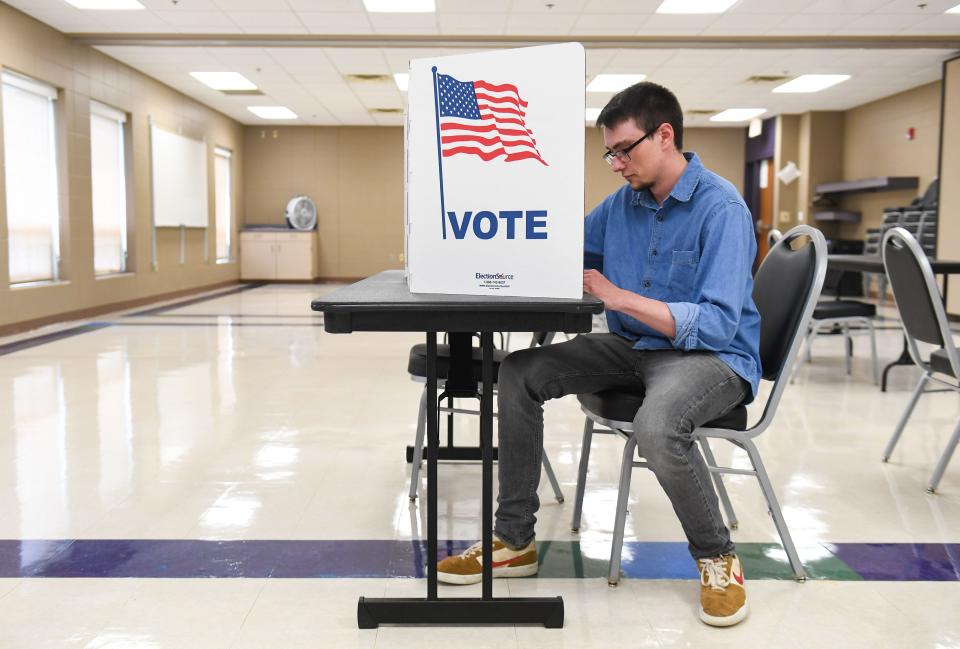Native Americans' right to vote has always been a question in South Dakota
EDITOR'S NOTE: This page is part of a comprehensive guide to voting rights across the U.S. and in Puerto Rico.
Voting rights in South Dakota look a little different when accounting for Native American residents.
Native Americans were granted citizenship and the right to vote in the eyes of the U.S. government with the passage of the Indian Citizenship Act of 1924. But the right to vote remained an open question in South Dakota, according to the 2006 Bone Shirt v. Nelson decision.
Since then, Native Americans have faced challenges getting access to the polls, from driving long distances to actually getting registered. Redistricting has played a role, too.
What has voting looked like for the Native American population?
Native Americans, of the nine recognized tribes in South Dakota, weren't fully granted the right to vote until 1951. The passage of the 1965 Voting Rights Act further enshrined the rights for Native Americans across the U.S.
Additionally, amendments passed in 1975 to the Voting Rights Act expanded preclearance provisions to Native Americans, including Shannon and Todd Counties in South Dakota. Preclearance required states with a history of discrimination to get federal approval before enacting voting changes.
However, between the passage of the amendments and 2002, the state placed more than 600 statutes and limitations that impacted elections and voting in Shannon and Todd Counties, but less than a handful were submitted for preclearance.
Preclearance protections were gutted in 2013 with the Supreme Court ruling in Shelby County v. Holder.
Challenges facing Native Americans getting to the polls
Native Americans living in South Dakota were surveyed for a report released in 2018 by the Native American Voting Rights Coalition
, a group dedicated to removing barriers to Native American voter registration and voting.
While 71% of the population surveyed were registered to vote, 29% said that traveling long distances to vote in-person was a problem.
The survey also asked unregistered voters why they had not registered in the state and 32% cited long distance to the registering office as an issue.
Even if Native American citizens managed to travel the distance to register to vote, it wasn't guaranteed they would receive a voter registration card.
"Local county governments remain stubborn, if not outright hostile, to Native American voting equality," according to the survey report.
A federal judge ruled in May that South Dakota was not following federal voter registration laws after the Rosebud Sioux and Oglala Sioux tribes brought a suit against the state in 2020.
The judge found that multiple state agencies like the Department of Public Safety and the Department of Social Services were not changing voter registration addresses for those who called to update their information over the phone and errors were made when transmitting voter registration from DPS to the county auditor.
Legislation introduced in the U.S. House of Representatives in 2021 would expand and protect Native American voting rights.

Redistricting fight
South Dakota's lone U.S. House seat allocation did not change following the 2020 census and U.S. Rep. Dusty Johnson remains the at-large congressman for the state. The redistricting process undergone by the state Legislature in 2021 drove a wedge between the moderate and far-right factions of GOP lawmakers, with the 11 Democratic lawmakers in the Legislature preferring new legislative districts proposed by GOP moderates. Adopted in November 2021, the new district boundaries are not being challenged in court.
However, redistricting on the local level is being challenged in federal court for citizens of the Lower Brule Tribe in south central South Dakota.
A federal judge issued a preliminary injunction early in August against Lyman County on behalf of the Lower Brule Tribe, which alleged the county violated their voting rights by delaying the implementation of a new redistricting plan.
The new plan would allow for Native American voters to be represented two county commissioners but because of the delay, the plan would not be implemented until after the November election.
"Lyman County is a small county and if demographic trends hold is headed to a point where it could be evenly divided between Native American and non-Native American residents," Chief Judge Roberto Lange wrote in his 49-page opinion. "Cooperation between the Tribe and the County, between Tribal members and non-Tribal members, is crucial to the future of Lyman County."
The county is now required to propose a remedial plan for the November election.
This article originally appeared on Sioux Falls Argus Leader: South Dakota voter access marred by Native American rights history
